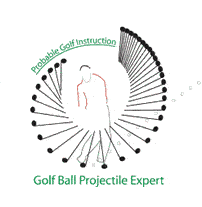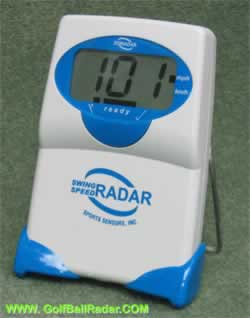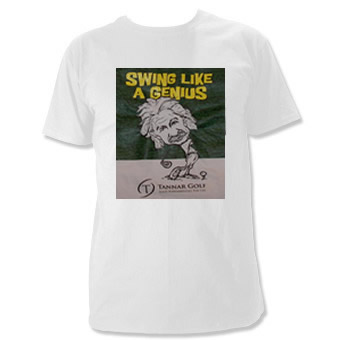

 Now, BreakMaster comes with a great DVD. Now, BreakMaster comes with a great DVD.
You'll learn:
how putts break
how to use the Breakmaster during a practice round
how to make professional greens and yardage book |
GOLF MAGAZINE FEATURES THE BREAKMASTER
In a recent issue of Golf Magazine, the BreakMaster Digital Green Reader was featured as one of the coolest new putting aids on the market. The article points out how the BreakMaster Owners Manual comes with tables (like the one on the right) that quantify the amount of break that putts will receive at different slope and putting distances.
Exelys is the only company in the golf industry that has ever done this kind of serious research to better inform golfers about how putts react to the break on the green (and take the guesswork out of putting).
That’s why hundreds of Tour Pros (including all the top names) on the PGA, Champions, LPGA and other tours rely on the BreakMaster to improve their putting and tell them how greens will break at tournaments.
The BreakMaster belongs in the golf bags of all your serious customers. And it’s also a great gift for the “golfer who has everything”
This kind of publicity in Golf Magazine (circulation 1.4 million) will mean your customers will be looking for the BreakMaster. Make sure your inventory is well stocked.
Retail Price
$99.95
+ shipping
Price includes shipping
|
Vijay Singh joins over 60 Tour Pros and caddies on the PGA, LPGA and Champions Tour who are currently using the BreakMaster for practice rounds and to help improve their green-reading abilities. But of course the BreakMaster isn't just for the pros: it helps golfers of all abilities improve their green reading, get to know the greens on the courses they play and lower their scores by making more breaking putts.
Purchase
yours today using PayPal.
The slope of the green is the single biggest factor in how much
your putt will break on the way to the hole, but the fact is:
most golfers have a hard time reading it. And why shouldn't we?
Our eyes were made for seeing, not for taking accurate measurements
of level.
For most
of the distance of your putt, the force of your putter stroke
is the determining factor on how the ball will roll. But
as the ball slows down on its way to the hole, the power of your
stroke has progressively less effect as the force of gravity
takes over. This is why the ball breaks the most as it nears
the hole.
Sometimes
you think you know which way a green is going to break, but
then the ball breaks differently than your eyes "told
you" it should. The reason for this is that golf course
designers often deceive our eyes by use of the terrain surrounding
a green. Trees, bunkers, mounds and swales all play a part
in these optical illusions. This problem is made even worse
if you're playing in a hilly or forested area where you can't
find a visible horizon line for reference.
The value of reading greens by plumb-bobbing
with your putter has been called into question by leading putting
experts. There
are two reasons for this. First, most putters don't hang in true "plumb." They're
made for putting, not for measuring slope. The second reason
plumb-bobbing doesn't work is that you need to be practically
laying down on the green surface in order to read the rim of
the cup as a horizontal line intersected by the vertical plumb
line of your putter: inconvenient at best.
So how do
you find the true break of a green?
How Much Will My Putt Break?
The BreakMaster will tell you accurate information about what's happening on the green that your eyes can never see: the exact break direction (downhill) as well as the exact amount of break (shown as degrees of slope).
But once you have this information, what do you do with it? How do you put BreakMaster data into practical use to adjust your putt?
At Exelys, we've done extensive testing in real-world situations to find out how much putts will actually break at various kinds of slopes. We've tested on greens of different types (bent grass, Bermuda grass) at varying green conditions and with various popular brands of golf balls. The following table can be a useful general guideline to helping you adjust your putt.
| Break/Dist. |
3 Foot Putt |
6 Foot Putt |
9 Foot Putt |
| 1 Degree |
4 - 6" |
10 - 12" |
14 - 18" |
| 2 Degrees |
8 - 10" |
16 - 18" |
22 - 26" |
| 3 Degrees |
10 - 12" |
20 - 24" |
40 - 46" |
| 4 Degrees |
14 - 16" |
38 - 42" |
52 - 58" |
Note: all of these measurements were taken putting straight across the break, meaning at a right angle to the downhill line (the break or fall line) which is indicated by the arrow on the BreakMaster display.
As you would expect, for each degree of break, a putt will break more and more depending on the length of the putt. Therefore, putting across a 1Degree slope (a fairly shallow break) can yield a break ranging from 4" for a 3 foot putt to 18" for a 9 foot putt.
Likewise, putting across a 4 Degree slope (a much more severe slope angle) can yield a break ranging from 14" to 58" (over 5 feet of break!) depending on the length of the putt.
Adjusting Your Aim Line
The drawings on the left illustrate the various readings from the table. You'll see that as the distance of your putt increases, you need to increase the amount of offset for your Aim Line. So for a 3 foot putt across a 1 Degree slope you need to adjust your Aim Line 4 - 6" from the hole to sink the putt, whereas if you were putting 9 feet across this same slope you'd need to adjust your Aim Line 14 - 18".
These numbers may change slightly depending on the speed of the green, and whether the green is wet or dry, so adjustments should be made to your putt according to these additional factors. We recommend entering these numbers in your Greens & Yardage Book to take out on the course with you.
Another interesting factor that can be useful on actual greens is that the Offset Angle (meaning the amount you must adjust your Aim Line uphill from the cup) is consistent (for each degree of slope) no matter what distance you are putting.
| Break Amount |
Offset Angle |
| 1 Degree Slope |
10 Degrees Offset from Hole |
| 2 Degree Slope |
15 Degrees Offset from Hole |
| 3 Degree Slope |
20 Degrees Offset from Hole |
| 4 Degree Slope |
30 Degrees Offset from Hole |
Referencing the table and the drawings you will see that, for example, a 2 Degree slope requires a 15 Degree Offset Angle from the hole. So, whether your putt is a 3 footer or a 9 footer, you need to adjust your Aim Line 15 degrees uphill from the hole and then make your stroke.
So once you know the amount of break (degrees of slope) this gives you another means of adjusting your Aim Line for your putt - sometimes far beyond what your eyes might tell you.
Uphill and Downhill Breaks
Not every breaking putt is going to be at exactly 90 degrees to the downhill break line. So how do you adjust the above numbers to fit these situations? Again, knowing the exact break direction (by using the BreakMaster) is infinitely preferable to merely guessing which way the ball might break.
By showing you the exact downhill break of a given putt, the BreakMaster allows you to see whether you're putting uphill across the break, or downhill across the break. Each of these putts will react differently, but in a predictable manner.
Uphill breaking putts will break LESS than putting straight across the break.
Downhill breaking putts (known as the "downhill slider") will break MORE than putting straight across the break.
So on the green, if you're putting uphill across the break, allow for a little less of a break. Likewise, if you're putting downhill, allow for a little more of a break than you would see in the numbers in the table.

|
Without accurate information, you have two choices: trust your
memory (from previous rounds) or guess. Rest assured, Pro Golfers
and Caddies never guess. When you're on the Tour, every stroke
counts. So Pro Golfers and their Caddies take time before tournaments
to make careful measurements and notations on greens and then
use that information to adjust the aim line of their putt during
the tournament. And the number one tool chosen by more and more
Tour Pros and Caddies to measure greens is the BreakMaster Digital
Green Reader.
Purchase yours today using PayPal.
 |
The BreakMaster Digital Green Reader is a precision
electronic device that accurately locates the downhill direction
(or break) of the green, measures the precise angle of slope
(amount or severity of break) and provides a full readout
of both on its LCD display.
To read a break, simply place the BreakMaster near the hole
on line with your putt and it will instantly show you the
downhill direction and exactly how many degrees of downhill
slope exist. The greater the angle of slope, the more the
putt will break downhill. The shallower the angle of slope,
the less the putt will break.
|
The BreakMaster
works equally well in reading the severity of an uphill or
downhill lie. Simply place the BreakMaster ahead of your ball
on line with the hole and its readout will give you a good
indication of how much to adjust your stroke for uphill or
downhill putts.
Since its introduction in 2003, the BreakMaster has become an
indispensable tool for Tour Pros on the PGA, LPGA and Champions
Tours as well as Professional Caddies and Golf Instructors.
See below
for the
Golf Pros that are currently using the BreakMaster.
What all these great golfers are discovering is that using the
BreakMaster in preparation for upcoming tournaments allows them
to train their eye for breaking putts and also to get to know
the exact breaks on the greens they will be playing in the actual
competition.
While the use of devices like the BreakMaster
(as well as laser range finders) is prohibited during tournaments,
there is nothing
illegal (according to the USGA Rules of Golf) about using the
BreakMaster during a practice round or walk-through of the course,
then making notes in a Greens & Yardage Book on how the greens
will break, and then to consulting that book during competition.
Tour Pros know that, in order to shave strokes off their score
cards, there's no substitute for actual knowledge of how a golf
course is going to play. And there's no better way to understand
breaking greens and take the guesswork out of green-reading than
by using the BreakMaster Digital Green Reader.
The BreakMaster is slim and compact so it fits easily into a
pocket without spoiling your stroke, it's weatherproof to withstand
damp greens and comes with a protective carrying pouch that can
attach to your belt or bag. The BreakMaster is available at fine
golf shops everywhere. If you can't find the BreakMaster at a
dealer near you, you may order it directly from us by clicking
on the link below.
Golf Professionals Currently Using The BreakMaster
PGA TOUR PLAYERS
Vijay Singh
Jerry Kelly (caddie Paul Tesori)
Kenny Perry (caddie Fred Sanders)
Bernhard Langer (caddie Russ Holden)
Alex Cejka (caddie Tracy Auman)
Briny Baird (caddie Michel Genois)
Brett Quigley (caddie Matt Hauser)
J.L. Lewis (caddie Danny McQuilken)
Robert Gamez (caddie Don Donatello)
Shaun Micheel
Ben Crane
John Riegger (caddie Daryl Smith)
Craig Barlow
Patrick Sheehan (caddie Valentin Lopez)
Jonathan Byrd (caddie Chuck Hoersch)
Ted Purdy
Jeff Brehaut
Danny Briggs
Michael Allen (caddie Michael Maroney)
Pat Bates (caddie Danny McQuilken)
Notah Begay III
Kyle Thompson
Rich Barcelo (caddie Damian Lopez)
Marco Dawson (caddie Tracy Auman)
Sandy Lyle
Michael Clark
Mike Standly
Ty Tryon (caddie Bill Tryon)
Katshunari Takahashi (caddie Andy Wada)
CHAMPIONS TOUR PLAYERS
Tom Watson
Ben Crenshaw (caddie Linn Strickler)
Craig Stadler
Hale Irwin
Bruce Lietzke (caddie Brian Lietzke)
Jerry Pate (caddie Frank Roberson)
Jim Albus
D.A. Weibring (caddie George Craver)
Tom Jenkins
Graham Marsh
Doug Tewell
Jay Sigel
Jim Ahern
James Mason (caddie Chris Mason)
Terry Dill (caddie Gary Cline)
Mark Johnson
Ed Fiore
Bob Eastwood
LPGA TOUR PLAYERS
Mi-Hyun Kim (coach Danny Yoon)
Lorie Kane (caddie Danny Sharp)
Karen Stupples
Catriona Matthew (caddie Graeme Matthew)
Jeong Jang (coach Danny Yoon)
Carin Koch (caddie Stefan Koch)
Aree Song
Dorothy Delasin (caddie Clint Begay)
Wendy Doolan (caddie Chris McCalmont)
Jill McGill (caddie Greg Gallup)
Sherri Steinhauer (caddie Audrey Gerdes)
Emilee Klein (caddie CJ Sturdevant)
Riko Higashio (caddies Paul Martinez, Clay Triolo)
Christina Kim
Soo Young Moon
Reilley Rankin (caddie Dan Huber)
Denise Killeen (caddie Billy Prentice)
Miriam Nagl (caddie Jeffrey Snow)
Sherri Turner (caddie Denice Lindman)
Maggie Will
Juli Hilton (caddie Robert Kendall)
Smriti Mehra
Clarissa Childs (caddie Larry Smich)
Suzy Whaley
Sung Ah Yim (caddie Chris McCalmont)
AMATEUR GOLF
Michelle Wie (coach BJ Wie)
Toni Wiesner (coach Bob Wiesner)
Brian Knopfler
CANADIAN PGA TOUR
David Faught
Kent Fukushima
Josh Habig
Eddy Lee
Andrew Smeeth
Brad Sutterfield
Todd Pence
Brian Unk
EUROPEAN TOUR
Arjun Atwal
Anders Hansen (caddie Nick Mumford)
NATIONWIDE TOUR
Jason Buha (caddie Dylan Vallequette)
Han Lee (caddie Josh Svendsen)
Andy Morse
Mason Petty
Scott Sterling (caddie Jeff Stoner)
Euan Walters
Boo Weekley
GATEWAY TOUR
Matt Stafford
Jason Griffin
HOOTERS TOUR
Jeremy Revis
GOLF ORGANIZATIONS AND SCHOOLS CURRENTLY USING THE BREAKMASTER
PGA of America, Palm Beach Gardens, FL
Tournament Committee: Tony Wallin, John Brendall, Steve Rintoul,
Steve Carman
PGA Champions Tour, Ponte Vedra Beach, FL
Tournament Committee: Gene Smith, Joe Terry
USGA, Far Hills, NJ
Director of Competitions: Mike Davis, Rules Committee: Robert
Bender
Florida State Golf Association, Tampa FL
Tournament Committee: Ken Hagamann, Charles Bedford
Kansas Golf Association, Lawrence, KS
Tournament Committee: Kim Richey
Kansas City Golf Association, Kansas City, MO
Tournament Committee: Steve McMillen
Walker Cup Team 2003, (All 10 Team Members)
U.S. team captain, Bob Lewis, Pepper Pike, Ohio
Mexico National Men's Team 2004
World Amateur Tournament, Tom Relf captain
Jim McLean Golf Schools, Miami, FL
Instructors: Chris Toulson, Jason Carbone, David Pezzino, James
Damiano
Jim McLean, PGA West, La Quinta, CA
Instructors: Carl Welty, Louis Sauer
David Leadbetter Golf Academy, Champions Gate, Bradenton, FL
Instructors: Gary Gilchrist, Gary Parrett
University of Tennessee, Golf Program, Knoxville, TN
Instructor: Jim Kelson Men's Golf, Judi Pavon, Women's Golf
Kansas State University, Golf Program, Manhattan, KS
Instructor: Kristi Knight, Women's Golf
University of Pennsylvania, Golf Program, Philadelphia, PA
Instructor: Francis Vaughn
See and
order all or my products at my golf
product order page.









